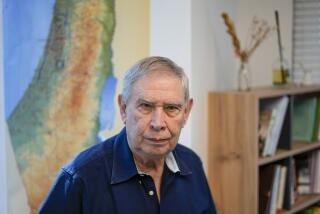Egypt president sees ‘deep state’ as enemy within
- Share via
CAIRO — President Mohamed Morsi casts himself as a leader navigating a landscape bristling with conspiracies by corrupt businessmen and shadowy figures plotting from inside a vast bureaucracy his Islamist inner circle has been unable to tame.
While protesters march, workers strike, students rally and the economy is in a scary tailspin, the president’s more serious nemesis may lie behind the scenes in what is known as the “deep state.” The courts, police, army and intelligence agencies were shaped over decades by the secular rule of deposed autocrat Hosni Mubarak.
Many police and intelligence officials in particular remain loyal to the old guard, fearing Morsi is moving the country away from its Western alliances and toward religious fundamentalism.
Morsi and his Muslim Brotherhood, which controls the government, accuse those connected to Mubarak of disrupting Egypt’s transition. Talk of intrigue is so pervasive that the Brotherhood’s website this month blamed “deep state corruption” for food poisoning that hospitalized nearly 500 students at Al Azhar, the country’s premier Islamic university.
Recent actions by the judiciary suggest state institutions are in fact moving to put limits on Morsi, who pushed through an Islamist-backed constitution and ignored legal decisions challenging his authority. Court rulings also have delayed parliamentary elections and called for Morsi to reinstate the general prosecutor he fired during a power grab in November. These verdicts came as police and internal intelligence officers — the core of Mubarak’s power — have staged work slowdowns and questioned Morsi’s legitimacy.
Security agents, police commanders and even clerks wielding rubber stamps are part of an imposing government labyrinth that encompasses the Interior Ministry and an edifice known as the Mogamma, a parallel universe of hundreds of thousands of public employees tied up in a system of patronage and favors.
His political opponents respond that Morsi, who was elected in June, is exaggerating the strength of the previous power structure — and that he wants to simply replace it with one loyal to him. Critics say he wants a Brotherhood version of his predecessor’s brand of control and cronyism.
The Brotherhood is backing a bill in the upper house of parliament that could limit judicial independence and force as many as 3,000 judges to retire. Judges claim the legislation is aimed at replacing them with jurists sympathetic to Islamists. Thousands of Brotherhood supporters demonstrated last weekend, calling for a “cleansing” of the courts.
Morsi and the Brotherhood have been “revealed as people who have no experience in ruling and are greedy for domination and power,” said Hassan Nafaa, a respected political science professor at Cairo University. “There’s a sentiment that the revolution was stolen and that there is an attempt at what many are calling the ‘Brotherhoodization’ of the state.”
The 85-year-old Brotherhood, once regarded as the only uncorrupted voice against the old regime, is now often compared to Mubarak’s disbanded National Democratic Party. A panel of judges, relying on a 1950s court ruling, has called for the Brotherhood’s dissolution, saying it was never a legal entity.
Morsi, however, speaks of hidden hands maneuvering to weaken his government from within and without: “Whoever sticks his finger inside Egypt, I will cut it off,” the president said recently. “I see the fingers of people getting inside who have no value in this world. They think that money makes them men.”
The president is seldom specific in identifying outsiders arrayed against him, but they are said to include Israeli agents and, at times, American officials. Egypt and the U.S. engaged in a brief but telling Twitter war recently over Washington’s criticism of Cairo’s interrogation of a popular television satirist charged with insulting Morsi. The State Department said Egypt was restricting freedom of expression; the Brotherhood accused Washington of “flagrant meddling.”
Conspiracies, real or imagined, are a dangerous topic in a country with deepening political and religious schisms, soaring inflation and joblessness, and an imploding economy.
The Brotherhood alleges that Mubarak loyalists and opposition leaders, who failed at the ballot box, want to spur a backlash against Islamist politicians. Antigovernment protests, including a growing number of labor strikes, have left scores dead and paralyzed Port Said and other cities in recent months.
Al Ahram newspaper quoted senior officials as saying Morsi “faces a coup attempt partially orchestrated and executed by the intelligence apparatus.” The paper went on to say that the president is worried about “certain loopholes” within the intelligence community.
But the disparate opposition rarely coordinates anything. It includes the largely secular National Salvation Front, ultraconservative Islamist Salafis, and businessmen and bureaucrats connected to former regime figures. Among the latter are Ahmed Shafik, whom Morsi narrowly defeated in last year’s presidential election, and Ahmed Ezz, a steel magnate and Mubarak family confidant imprisoned on corruption charges.
Ezz and Shafik, a retired general who fled the country after Morsi’s victory, are emblematic of the deep state’s nexus of politics and money.
Brotherhood supporters have accused old guard operatives of paying armed thugs to infiltrate antigovernment protests and spark riots. The deep state has also been accused of setting courthouse fires to destroy evidence against Mubarak allies, including Safwat Sharif, the former speaker in the upper house of parliament.
Instability has damaged Egypt’s stature as it negotiates a $4.8-billion loan from the International Monetary Fund. The desperate economic condition has forced Morsi to seek loans and aid from Qatar and Iraq. Neighboring Libya recently promised to deposit $2 billion into Egypt’s central bank.
The Brotherhood has steadily tightened its hold on public institutions. Morsi has appointed five Brotherhood members as governors. The prime minister’s office and key ministries, including justice, finance, health and interior, are controlled by the group or its sympathizers. Rural preachers have also accused the government of replacing imams at state-run mosques with Brotherhood supporters. Mosques are used as vital campaign stops during elections.
Some commentators say the political opposition’s best option is to advance a strategy of protest and unrest that would force a military coup to prevent economic collapse.
“The army will have to make up its mind again very soon. The state remains as vulnerable as it used to be,” said Ziad Akl, a senior analyst at Al Ahram Center for Political and Strategic Studies. “If people decide to rise against the state, the army will be put in the same shoes they were in before.”
Others doubt the generals, who ruled for nearly 17 months after the 2011 fall of Mubarak, want to return to governing. Egyptians revered the army, but human rights abuses and political gridlock have tarnished its image. The military, despite recent veiled threats to intervene, has so far sided with Morsi, who this year backed a constitution granting the army wide autonomy and protecting its business empire.
The Brotherhood’s strategy has been to portray political enemies as spies and infidels, which, especially in the provinces, has raised suspicions about the National Salvation Front and other opposition parties.
“Anyone who speaks out against the crimes of the Brotherhood is soon bombarded with accusations and slander,” Egyptian novelist Alaa Aswany wrote last month in As-Safir, a Lebanese newspaper. “In their opinion, the Brotherhood’s opponents are either remnants of the Mubarak regime, agents of international Zionism, secret Freemasons or, at best, immoral, sexually [deviant] individuals whose main goal in life is to spread immorality in society.”
Parliamentary elections expected in the fall will be a barometer of the Brotherhood’s remaining popularity. Despite a marked slide in its appeal, it remains formidable in the provinces. That support could diminish if instability continues and ultraconservative Salafis broaden their reach into Morsi’s base.
“If they [the Brotherhood] lose the majority in elections, I think their political weight will end forever,” said Nafaa, the Cairo University professor. “It is clear that they are not an alternative to the previous despotic regime.”
Special correspondent Ingy Hassieb contributed to this report.
More to Read
Sign up for Essential California
The most important California stories and recommendations in your inbox every morning.
You may occasionally receive promotional content from the Los Angeles Times.














